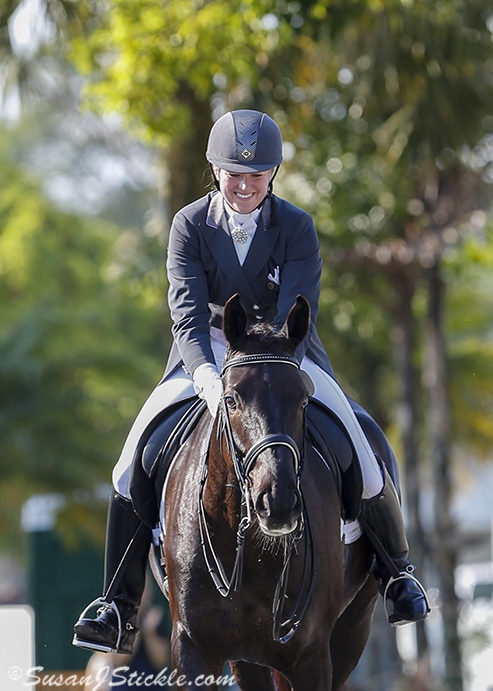
 I had the most incredible ride yesterday. I’m pretty much on top of everything for the Grand Prix on Ella, but there’s a gear in the passage I’m still not 100 percent confident in, and in my last lesson with Michael he put me on a 20-meter circle in passage and had me just play with it—what happens when I use my leg like this, what happens when I use my seat like that, until I cultivated the passage I wanted.
I had the most incredible ride yesterday. I’m pretty much on top of everything for the Grand Prix on Ella, but there’s a gear in the passage I’m still not 100 percent confident in, and in my last lesson with Michael he put me on a 20-meter circle in passage and had me just play with it—what happens when I use my leg like this, what happens when I use my seat like that, until I cultivated the passage I wanted.
Yesterday, I rode outside, as it’s just gorgeous in Virginia right now. The sun was low on the horizon, and it was cool and crisp, and the birds were chirping, and the air smelled like apple blossom, and ultimately none of those things mattered because as I rode, I had one of those cool tunnel vision moments, where the whole world falls away and it’s just me and the horse.
In his book “The Talent Code,” which I highly recommend, if you haven’t read it, author Daniel Coyle calls moments like that “deep practice.” Unlike regular practice, this is deep, profound and zen-like, and it’s the most important and powerful practice of a task you can do. It’s fleeting. When you’re in that place, the world becomes very small and very quiet.
I love moments like that, rare as they are. They are, fortunately, as rare as the equally quiet, small world moments I experienced riding tests in the beginning of my career, the moments where I’d warm up, go down centerline… and completely fall apart.
I call it “Horse Show Brain.”
It manifests a little different for everyone who experiences it. For me, when it would happen, everything suddenly speeds up. Everything happens faster and faster, it seems, no matter what speed we’re actually going. For others, I’ve heard it described as a zoning out, where you “wake up” and the test is nearly over and you’re not sure you how got there. And for still others, something starts to go awry, and all of the tools you’ve learned as a rider suddenly elude you, like when people get under the spotlight to sing the National Anthem and the words spontaneously vacate their brains.
At a recent show, two of my students made big, important level move-ups, one to third level, one to Prix St. Georges. Both are good riders on solid horses (that we’ve trained up the levels ourselves, thankyouverymuch) who are totally ready for the level. Both are also very bright women, smart and successful both personally and professionally. They’ve been running through the test at home, without problems. They were ready.
And because I’ve been doing this a long time, I knew that one of two things was going to happen.
Option A was that on Day 1 they were going to remember all that they’ve learned, show up, ride their tests like we’ve practiced, have a great time, and then do the same on Day 2.
Option B was that on Day 1 they were going to freeze up, ride below their usual standard, spend all night fuming, and ride like rockstars on Day 2.
Guess which happens most often? And guess which happened to them?
That’s not entirely true. My student making her third level debut kept her wits about her for most of the test, only falling apart a bit in the flying changes, and you could see it happen, watching her face.
Bless my Prix St. Georges student, her brain left the building entirely.
And sure enough, we got dinner that night, and everyone was frustrated and sullen, and the next day they both manned up, got it together and rode like champs.
It’s so frustrating, as a trainer, watching your students go through this. I imagine that it’s a lot like parenting, watching your young children get dumped, or get their first C grade, or not get picked for the team; you know it’s going to happen, and you know it’s going to make them better in the long run, but you wish you could take the pain and frustration away.
But I can’t, and so I watch my wonderful students flame out, and then I’m there to hold their hands while they vent, and then help them put themselves back together for Day 2, when they keep themselves together, rely not on their reptilian brain but on their big ol’ frontal lobe, the one that knows to drive into the changes, the one that knows to let go of the curb rein, the one that knows that the most important part of the half halt is the letting go part after, the one that remembers to keep the leg on and the butt down and to not stare at the neck.
And maybe, one day soon, they’ll have a ride where the birds and the trees and the crowd and their fears and the rest of the whole wide world disappears, and it’s just them and their horses alone in that beautiful zen-like state that allows the greatness to come through.
(And if not, there’s aways cupcakes and margaritas. They help. A lot.)
Lauren